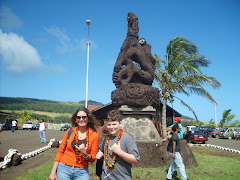

I really enjoyed reading the chapters from the book, The Man Who Knew Islands, by David Quammen. Having spent time in the Amazon region in 2005 I can truly relate to Alfred Wallace's dismay when first embarking upon his journey and discovering there was a big difference between an abundance of a certain species and a diversity of species. When I first arrived in Equador I was told there were 85 different kinds of Hummingbirds so I expected to see hummingbirds everywhere, practically bombarding us as we walked through the region. That did not happen. However, if one is ambitious enough to wake up at 5:00 in the morning and try their luck (and patience) at birdwatching, you may be fortunate to see a few variations of hummingbirds along with a few other species of animals in the several hours you devote to that passion. I did see one monkey in the outing, and one hawk-like bird of prey. I also decided that birdwatching was not for me and can truly appreciate all the tedious hours and years that Wallace put into his work, only to have it all burn up in a fire.

There were some other interesting discoveries made on his journey in the field of Biogeography that I find fascinating. The fact that continental islands and oceanic islands differ in the way that they are formed: the former being attached to the continent and separated only by a submerged land bridge and the latter being created by volcanic activity out in the ocean (like Hawaii and the Galapagos). Wallace points out that, "a continental island begins with everything and everything to lose... An oceanic island begins with nothing and everyting to gain" (54). He also notes that one needs to study islands to gain insight into evolution (55).
Whatever happened back in 1858 with regards to who came up with the idea of Natural Selection, Darwin or Wallace, both were men dedicated to the notion and science of evolution. Both men had their ideas and worked hard to prove their theories, but it bothers me to think that all my life I have attributed the idea of Natural Selection solely to Darwin when, after reading these chapters, believe perhaps that I have been wrong. Wallace put his whole heart and soul into his findings; he spent four years in the Amazon, isolated and lonely collecting plant and animal species only to have them go "up in smoke" on his return to England. He then traveled to the Malay Archipelago to study for another couple of years, revealing his findings to his friend, Charles Darwin who appears to have gotten most of the credit. I don't undermine Darwin's work, but realize that the History and Science classes from my youth need to be revised and retold, giving credit where credit is due.


1 comment:
Barbara,
I am interested in your visit to Ecuador and how you didn't see much wildlife. In the Dodo chapter, it mentioned that even though there are many varieties of species in the jungles, there is not much abundance of creatures. It's a pretty quiet place. It sounds like that is your experience.
You wrote a comment on my blog page a while back asking about Firkin and Fox in Carson City. The building it is in was built in 1862as two separate businesses, but later it became one hotel. The two buildings used to be the St. Charles Hotel and Muller's Hotel separately. It is the second oldest hotel in Nevada (Gold Hill hotel in V.C. is oldest), but the first oldest continuously run as a hotel.
As far as Firkin and Fox goes, I've heard great things about it as a restaurant (haven't been there yet). My friend said its food is diner-style, but VERY good, and its atmosphere is really unique. She said it's obvious they put a lot of money into the place, and it's worth visiting.
Post a Comment